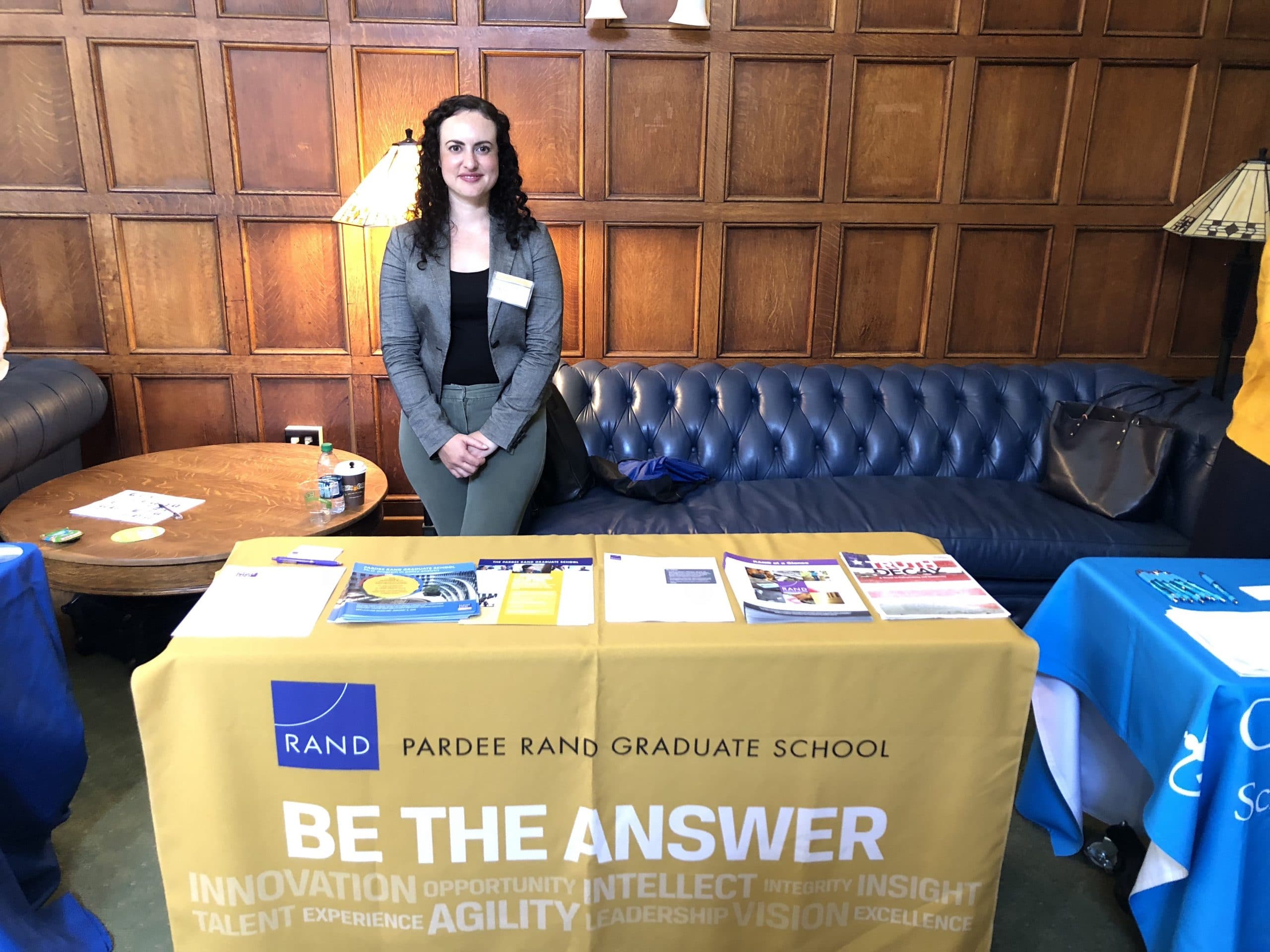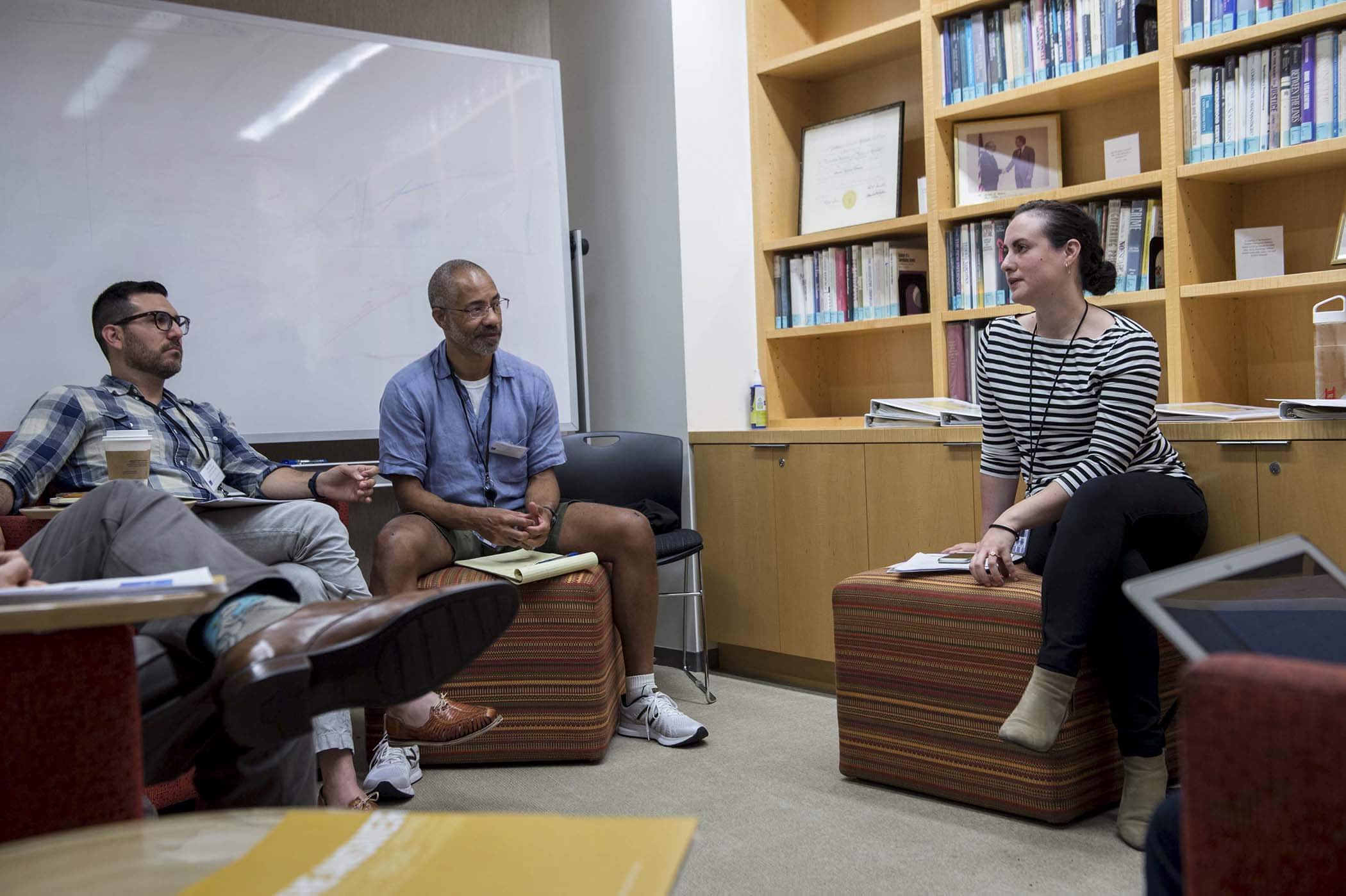
Pardee RAND Research Fellows have a deep and abiding passion to use policy to improve lives. Their selective, multidisciplinary doctoral program focuses on policy analysis and the ways it can shape our world. Located in Santa Monica, California, they offer a full-time, residential Ph.D. program in policy analysis — the first and largest of its kind in the country. Pardee RAND’s fully funded program enables students to cover their tuition while receiving a consistent stipend for living expenses each year and graduate debt-free. Students, who come from around the world, must have a bachelor’s degree and be available to participate in a full-time combined research-and-study program at RAND’s headquarters in Santa Monica, California. Tuition and a stipend for living expenses each year are provided. Nearby subsidized housing is also available.
We talked to Alexandra Mendoza-Graf, a current Pardee RAND Research Fellow, to learn more about the program and get some application tips.
1. What inspired you to apply for the Pardee RAND Research Fellowship?
I am a doctoral fellow at the Pardee RAND Graduate School working on a three-paper dissertation that focuses on health and educational outcomes for people living in areas that are experiencing gentrification. As a first generation Mexican-American, I am the first in my family to pursue a graduate degree. I grew up in a predominantly low-income, immigrant community in Los Angeles, and the social issues I witnessed and experienced growing up really motivated me to pursue studies in public policy. I obtained a BA in political science and a master’s in public policy. Following my master’s program, I worked on several research projects at various research centers within UCLA, and although this is not an area of work that I initially intended to pursue in my career, I found myself very drawn to research and wanted to pursue more opportunities in that space. I soon learned, however, that I lacked certain skills to conduct research in systematic and rigorous ways, and I found myself searching for opportunities to improve my research skills. At the same time, I quickly realized that I could only get so far in a research career with a master’s degree.
It wasn’t until this point that I began to seriously consider pursuing a PhD and had many conversations with mentors about whether such a big commitment was actually necessary to achieve my career goals, given no one in my family nor many people I knew had ever pursued a PhD. Coincidentally, my then boyfriend and now husband was in the middle of his second year at Pardee RAND, and I found myself reaching out to him with a lot of methodological questions. I was always so impressed by his ability to come up with great resources and his breadth of knowledge about the variety of research topics I would approach him with. I was also struck by all of the practical examples and anecdotes he was able to provide from his experiences doing on-the-job training within the program. This is when I realized that the PhD program at Pardee RAND provided a unique experience that allowed doctoral fellows to not just learn new skills but also apply those skills working within research projects that are ongoing at RAND. This really solidified my interest and excitement about this program, and I knew that it was a much better match for me than most other more traditional PhD programs.
2. What are the benefits of the fellowship?
One of the major benefits for me was the ability to continue working through on-the-job training. This was both due to personal preferences to continue working but also due to the monetary benefits of it. The two degrees I pursued prior to the PhD left me with a lot of student debt, and the ability to earn a stipend while in the program as well as finish the program debt-free were incredible benefits that made the program more accessible to me. Additionally, the fact that we have such a large pool of researchers to work with gave me enormous opportunities to expand my horizons in terms of the breadth of topics I could work on as well as the experience of getting to work with people who have a range of working styles and areas of expertise.
I have also been continually struck by the importance of some of the projects I have worked on and the impact they have been able to make in the field. Some examples of projects I have worked on include projects with: FEMA where we assisted in the development of Puerto Rico’s recovery plan following Hurricane Maria; the Texas Higher Education Coordinating Board where we provided technical assistance and recommendations for the implementation of a policy to help support the advancement of community college students who were not college-ready; and the city of New York to provide recommendations for improving availability and accessibility of mental health care for underserved populations.

3. What tips would you give others applying to the Pardee RAND Research Fellowship?
Think about what you want out of your PhD experience and whether this is the right program for you. It’s a fast-paced program and provides a lot of opportunities for expanding your skillset but also requires you to be proactive and market yourself to researchers to build your network and obtain positions on projects, so really think about whether that’s the type of environment you are looking for. As you are trying to make that decision, reach out to researchers to get a sense of whether it’s the type of work you would like to do. Talk to former and current students to ask about their experiences and any advice they may have. Once you do some of that thinking and reaching out to people, you can use insights you gain to better develop your application.
For the application itself, I would say to be as honest and genuine as possible. The review committee really wants to get to know you through the application and understand your motivations for wanting to be in this specific program, as well as what you can add to the program in terms of perspectives, work experiences, and lived experiences. The more they can see your genuine passion, drive, and dedication for pursuing the kind of work that you would do while in the program, the more likely they are to consider you for admission. In short, I would say, don’t spend a lot of time trying to figure out what you think the review committee wants to hear and instead really try to tell your story.
Alexandra Mendoza-Graf is an assistant policy researcher at the RAND Corporation and a doctoral fellow at the Pardee RAND Graduate School. She is a first generation Mexican-American and first in her family to pursue a PhD. Her research interests include education and social determinants of health, and her dissertation research focuses on health and educational outcomes of residents living in gentrifying neighborhoods. She has an M.P.P. from the Luskin School of Public Affairs at the University of California, Los Angeles (UCLA), and a B.A. in political science and public policy from the University of California, Berkeley.
Interested in applying? Bookmark the Pardee RAND Research Fellowship to your ProFellow account.
© ProFellow, LLC 2021, all rights reserved.